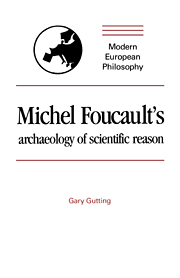Book contents
Summary
Any study of Michel Foucault should anticipate two sorts of readers. On the one hand, there are those intrigued by what they have heard of his ideas and methods but frustrated by texts they find too difficult to penetrate. They turn to secondary literature to dispel their bemusement and confusion. On the other hand, there are those who have worked through at least some of his books with understanding and appreciation and are looking for further interpretative and critical perspectives. In writing this book, I have tried to keep both audiences in mind. I have put a very high premium on lucid and thorough explanations of Foucault's ideas, and my analyses offer coherent interpretations of each work as a whole, contrary to the tendency of many commentators to highlight only selected aspects of a given text. Because of this, I hope the book will be a useful resource for those making a first approach to Foucault's thought. For those already familiar with Foucault, it offers a new perspective that places his thought in the context of recent French history and philosophy of science, particularly the work of Gaston Bachelard and Georges Canguilhem. (It also provides an introduction to these two thinkers, who are not very well known in English-speaking countries.) This opens up a fresh and, I hope to show, fruitful way of understanding Foucault as a historian and philosopher of science, balancing and complementing the current standard construal of him as a social critic and theorist.
- Type
- Chapter
- Information
- Michel Foucault's Archaeology of Scientific ReasonScience and the History of Reason, pp. ix - xivPublisher: Cambridge University PressPrint publication year: 1989

